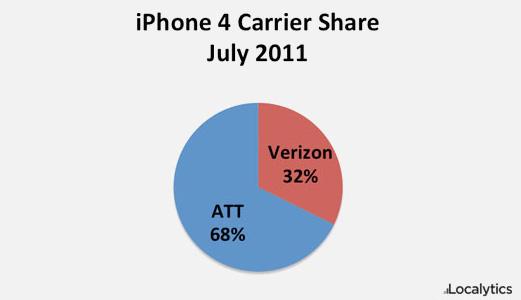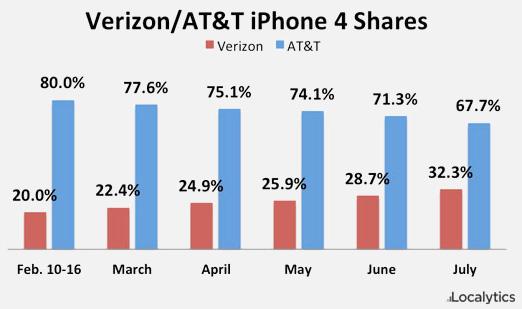Verizon iPhone 4 accounts for 32% of all US iPhone 4 traffic
Mobile analytics firm Localytics published a report on on Thursday charting the growth of the Verizon iPhone 4 since it launched in February, as noted by Brad Reed of Network World. The report compiles data from app usage during the last week of the month to reflect each carrier's market share.
As of July 1, Verizon's share of all U.S. iPhone 4 traffic stands at 32 percent, compared to AT&T's 68 percent share. According to the report, the carrier's presence quickly jumped to a 20 percent share shortly after launch before slowing down to modest gains in the spring. Then, in May and June, Verizon's share of U.S. iPhone 4 app usage experienced a spike in growth, growing from 25.9 percent to 32.3 percent.
The firm speculated that adoption on Verizon may have ramped up ahead of the carrier's July 7 transition away from unlimited data plans. The wireless operator had previously warned that unlimited iPhone plans would only be available for a limited time. A leak last month correctly predicted the July 7 change.
Rival carrier AT&T did away with its unlimited data plans last June, though some subscribers reported having been offered an unlimited plan from the company earlier this year as the Verizon iPhone launch loomed.
Verizon announced in April that it had activated 2.2 million iPhone 4 units less than two months after the device's launch, making it the most successful handset launch in the company's history. By way of comparison, AT&T activated 3.6 million iPhones in the first quarter of this year, though that figure also includes a portion of iPhone 3GS models sold. All told, Apple sold 18.65 million iPhones during that period.
Apple is expected to simultaneously launch the iPhone 5 on both Verizon and AT&T. Various reports have suggested that the next-generation handset will be a dual-mode GSM-CDMA device.
Rumors of the iPhone 5 have picked up steam as of late ahead of an expected fall release. On Wednesday, The Wall Street Journal reported that the next-generation device will be thinner and lighter with an 8-megapixel camera.
 Josh Ong
Josh Ong















 Amber Neely
Amber Neely
 Thomas Sibilly
Thomas Sibilly
 AppleInsider Staff
AppleInsider Staff
 William Gallagher
William Gallagher
 Malcolm Owen
Malcolm Owen
 Christine McKee
Christine McKee










32 Comments
Wow 32% in four months. That was fast! Though these numbers might plateau thanks to the new tiered plans.
I get that the carrier tie-in is more percentage-profitable for Apple but to rob themselves of such a larger customer base? I think Apple have got this very wrong.
They'd be neck & neck with Android with a more conventional sales strategy & earning loads more. Their original plan failed to account for incumbent carrier lock-in.
Imagine if they could talk and surf?
Imagine if they could talk and surf?
It'd be nice if "we" could, but AT&T's service sucks out here. That's why I have Verizon. If it wasn't for that I might've given AT&T a try if it wasn't for that. Whenever apple implements 4G-LTE in a iPhone, that'll be a problem of the past for us Verizon wireless subscribers. Until then!
I get that the carrier tie-in is more percentage-profitable for Apple but to rob themselves of such a larger customer base? I think Apple have got this very wrong.
They'd be neck & neck with Android with a more conventional sales strategy & earning loads more. Their original plan failed to account for incumbent carrier lock-in.
You're simply not thinking about this clearly.
People think that Android grew faster than Apple becuase Apple made a mistake, but that's simply incorrect. Android grew faster because it has a different model, Apple didn't want to license their OS so they could never have grown at the same speed - they had to ramp up manufacturing and negotiate contracts.